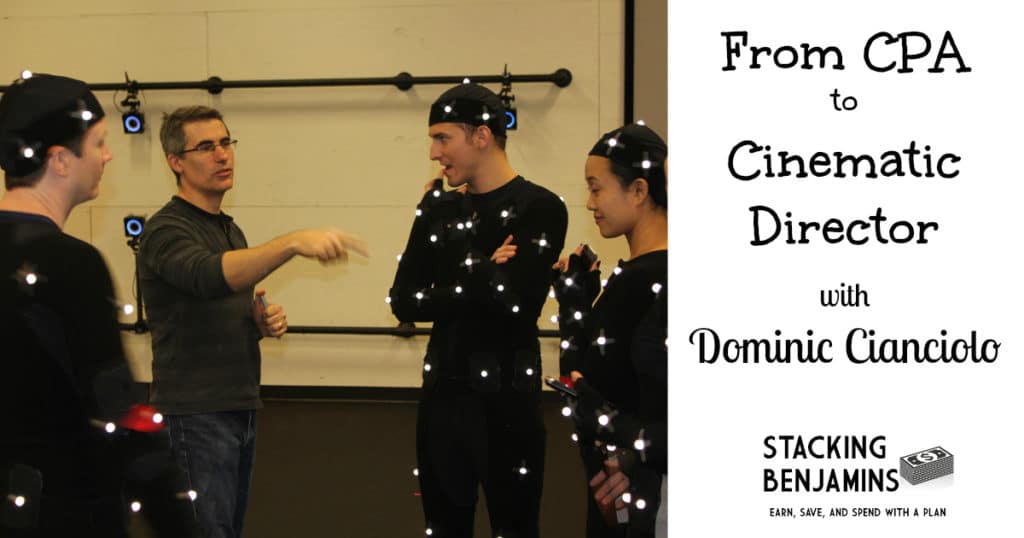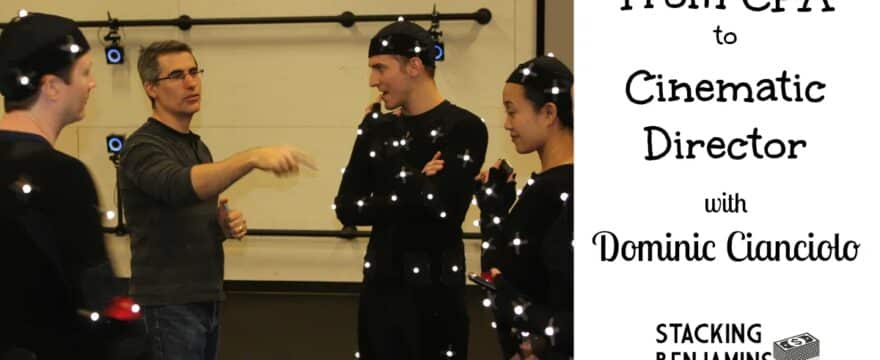What does a popular video game’s cinematic director have to do with money? You’d think….not much, but you’d be wrong. Dominic Cianciolo is in charge of the storyline cinematics for the popular Mortal Kombat X, but he used to be a CPA working in taxation. How did he make the jump from finance to the creative world of video games? We asked him when he was nice enough to stop by the basement last week:
Joe: Welcome to the basement, Dominic!
Dominic: It’s great to be here. Thanks for having me.
Joe: it’s cool you’re here, because as you can see we have an old Atari 2600 over there in the corner we can play later. Have you always been a video game guy?
Dominic: No, actually I started in film before going to video games. Short films…a couple odd commercials and that kind of thing. I then decided to move into 3D animation and finally found my way into video game cinematics.

Joe: But you weren’t always a creative guy. You were in finance before that originally?
Dominic: Yeah, tax specifically. I was working for what was then a big six accounting firm doing international tax. I’d always had an interest in film, though. After a year and a half out of law school and doing tax work, I realized I’d made some big mistakes in my professional aspirations and needed to move on to do other things.
Joe: What would you say some of those mistakes were that you made?
Dominic: It was not listening to that voice in your head about what you really want to be doing….and treating things like they’re unattainable. You can get almost anywhere you want to go via good work and a couple breaks here and there….then staying at your goals and focused on what you want to do.
Joe: While you were doing tax work did the voice in your head ever say, “I’m making great money….I need to keep doing this”?
Dominic: No. It was never really about that. It was about what I wanted to be looking back on when I was 65 years old and getting ready to possibly retire….and how I wanted to spend the majority of my time on creative endeavors than the business endeavors I’d been doing.
Joe: Did you go to film school at any point?
Dominic: No. I’m nearly entirely self-taught. I took classes here and there, but it was mostly reading as many books as I could before I moved to California, working on some small Super-8 films (that’ll age me on when I was growing up!), and then once I got to LA working on as many projects as I could, sometimes for money, sometimes not….and learning from everything and everybody I could.
Joe: Did you have an emergency fund and your financial house in order when you made the jump from one career to something completely unrelated?
Dominic: Yes, but I never had a time I wasn’t working while taking on my film endeavors. I transferred to LA with the firm I was working for, and then when I found the opportunity to take another full time job that would provide more direct experience, I took that. I was basically not sleeping for two and a half years. I worked a day job and then worked night shoots and weekend shoots and that kind of thing.
Then, of all the blessings you could have….I had some software projects I was doing at the big six firm…and after I left they brought me back as a consultant on the project. It grew so big that I was able to quit my day job and then consult on my own time, and had that fund my film habit. I was very fortunate in that regard.
((Editor’s aside: Isn’t it amazing that people who work really hard and network are “very fortunate?”))
Joe: That’s awesome you were able to have money keep coming in because so many people have to quit pursing their dream because they don’t have enough cash coming in to keep pursuing their goal. Do you think your financial background helps your directing in any way?
Dominic: It definitely comes into play. As a director you have to be cognizant of the money you’re spending. Plus, to be able to work with producers who know you have an eye on the bottom line as much as they do makes it easier to sell people on things. You also have a better idea where you need to move money around to get your vision on screen better.
What about Dominic’s personal approach to finance? How about his relationship with Ed Boon, the iconic director of Mortal Kombat? We asked him those questions and more on the podcast. Check it out: From Accountant to Cinematic Director with Dominic Cianciolo


Leave a Reply